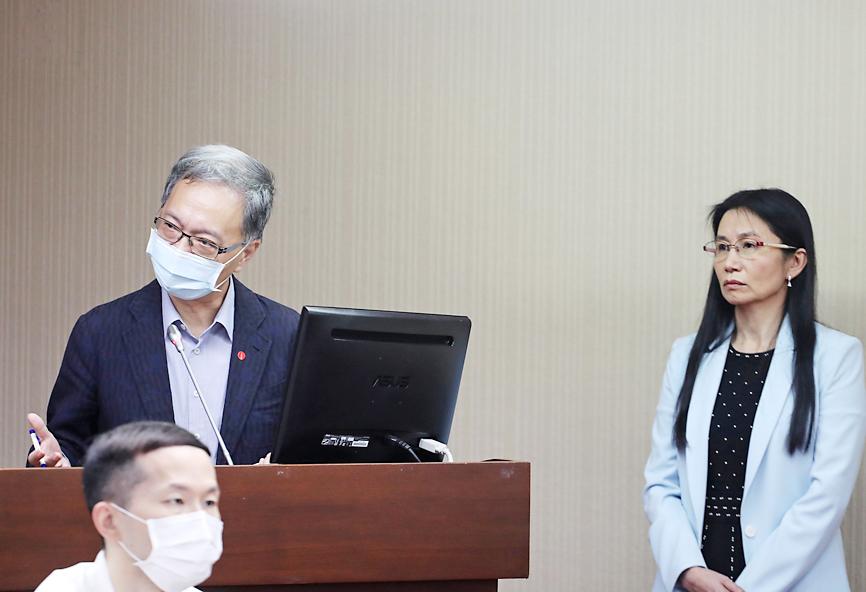Lawmakers yesterday questioned the legality of an online platform set up by the government to recruit participants for COVID-19 vaccine clinical trials.
The Central Epidemic Command Center (CECC) launched the online platform on Wednesday last week, and said people can sign up until Nov. 30.
Minister of Health and Welfare Chen Shih-chung (陳時中), who heads the center, said at the time that three domestic manufacturers that are developing COVID-19 vaccine candidates would soon complete phase 1 clinical trials and as phase 2 vaccine trials would need more participants, the CECC launched the platform to help shorten the recruitment process and speed up the trials.

Photo: CNA
As of yesterday, more than 19,000 people had registered, close to the center’s target of 20,000.
At a meeting of the legislature’s Social Welfare and Environmental Hygiene Committee yesterday, Chinese Nationalist Party (KMT) Legislator Chiang Wan-an (蔣萬安) said that the online registration could be illegal, as it does not provide warnings in accordance with regulations on clinical trial recruitment for volunteers, the advert has not received approval from the Institutional Review Board and it likely breached other regulations.
“The trial advert must not have provisions stating that participants will receive free medical treatment or a financial subsidy, or that it is available for a limited time only to push people to sign up before the deadline,” Chiang said.
“It must not contain words, graphics, photos or illustrations to entice or force people into signing up,” he added.
In the past, the ministry would issue regulations warning people about the risks associated with clinical trials, “but now [the trials] were publicized through a press conference, which was also circulated through online platforms such as Line, Facebook and others, and only presented the potentially good points. We did not see any warnings about possible side effects and associated risks,” he added.
“The government has set a bad example, skirting around possible illegalities. In the future, can pharmaceutical firms and companies making medical vaccines do the same? That is, they can first publicize on an online platform to collect the personal data of volunteers, then claim it was not an open call for participants,” Chiang said.
Democratic Progressive Party Legislator Lin Shu-fen (林淑芬) also questioned the program.
“The trials would involve more than 20,000 people, but if something goes wrong, can the victims receive compensation, and what if the vaccine company cannot pay?” she asked. “Our government led the way in publicizing the trials, but not in shouldering the responsibility for compensation. Is this proper?”
Deputy Minister of Health and Welfare Hsueh Jui-yuan (薛瑞元) clarified that it was only a platform for registration, and not an official recruitment for clinical trial participants.
“The platform is a means for people to register, and asking them if they are willing to take part in the clinical trials, to provide their personal information. When the trial program is approved, then the official recruitment can start, and the vaccine company can select suitable volunteers,” Hsueh said.
As to whether the advert conforms to the law, it will have to be judged on a case-by-case basis, he added.

The Ministry of Economic Affairs has fined Taobao NT$1.2 million (US$36,912) for advertisements that exceed its approved business scope, requiring the Chinese e-commerce platform to make corrections in the first half of this year or its license may be revoked. Lawmakers have called for stricter enforcement of Chinese e-commerce platforms and measures to prevent China from laundering its goods through Taiwan in response to US President Donald Trump’s heavy tariffs on China. The Legislative Yuan’s Finance Committee met today to discuss policies to prevent China from dumping goods in Taiwan, inviting government agencies to report. Democratic Progressive Party Legislator Kuo Kuo-wen (郭國文) said

The Ministry of Economic Affairs has fined Taobao NT$1.2 million (US$36,900) for advertisements that exceeded its approved business scope and ordered the Chinese e-commerce platform to make corrections in the first half of this year or its license would be revoked. Lawmakers have called for stricter supervision of Chinese e-commerce platforms and more stringent measures to prevent China from laundering its goods through Taiwan as US President Donald Trump’s administration cracks down on origin laundering. The legislature’s Finance Committee yesterday met to discuss policies to prevent China from dumping goods in Taiwan, inviting government agencies to report on the matter. Democratic Progressive Party

Taiwan and its Pacific ally Tuvalu on Tuesday signed two accords aimed at facilitating bilateral cooperation on labor affairs, according to Taiwan’s Ministry of Foreign Affairs (MOFA). The governments inked two agreements in Taipei, witnessed by Foreign Minister Lin Chia-lung (林佳龍) and visiting Deputy Tuvaluan Prime Minister Panapasi Nelesone, MOFA said in a news release. According to MOFA, the agreements will facilitate cooperation on labor issues and allow the two sides to mutually recognize seafarers’ certificates and related training. Taiwan would also continue to collaborate with Tuvalu across various fields to promote economic prosperity as well as the well-being of their

Sung Chien-liang (宋建樑), who led efforts to recall Democratic Progressive Party (DPP) Legislator Lee Kun-cheng (李坤城), was released on bail of NT$80,000 today amid outcry over his decision to wear a Nazi armband to questioning the night before. Sung arrived at the New Taipei District Prosecutors’ Office for questioning in a recall petition forgery case last night wearing a red armband bearing a swastika, carrying a copy of Adolf Hitler’s Mein Kampf and giving a Nazi salute. Sung left the building at 1:15am without the armband and covering the book with his coat. Lee said today that this is a serious